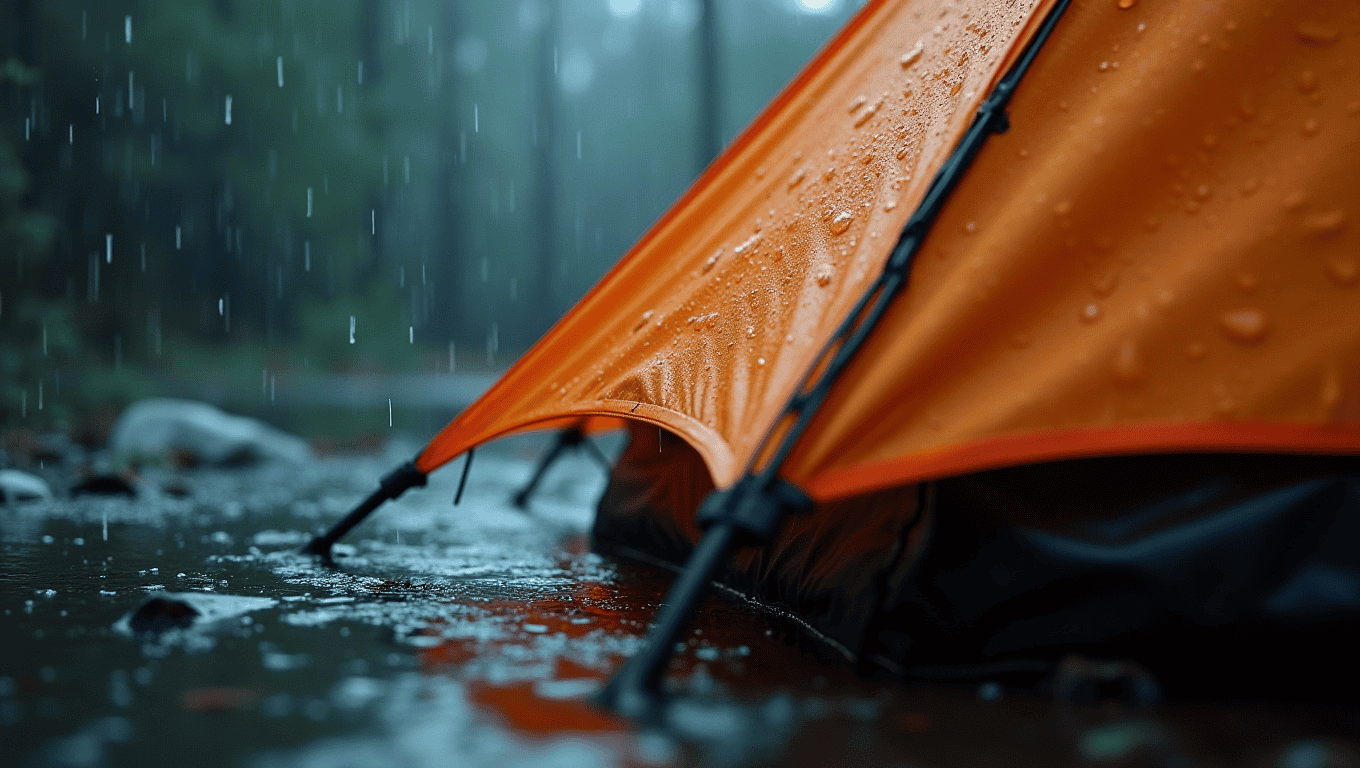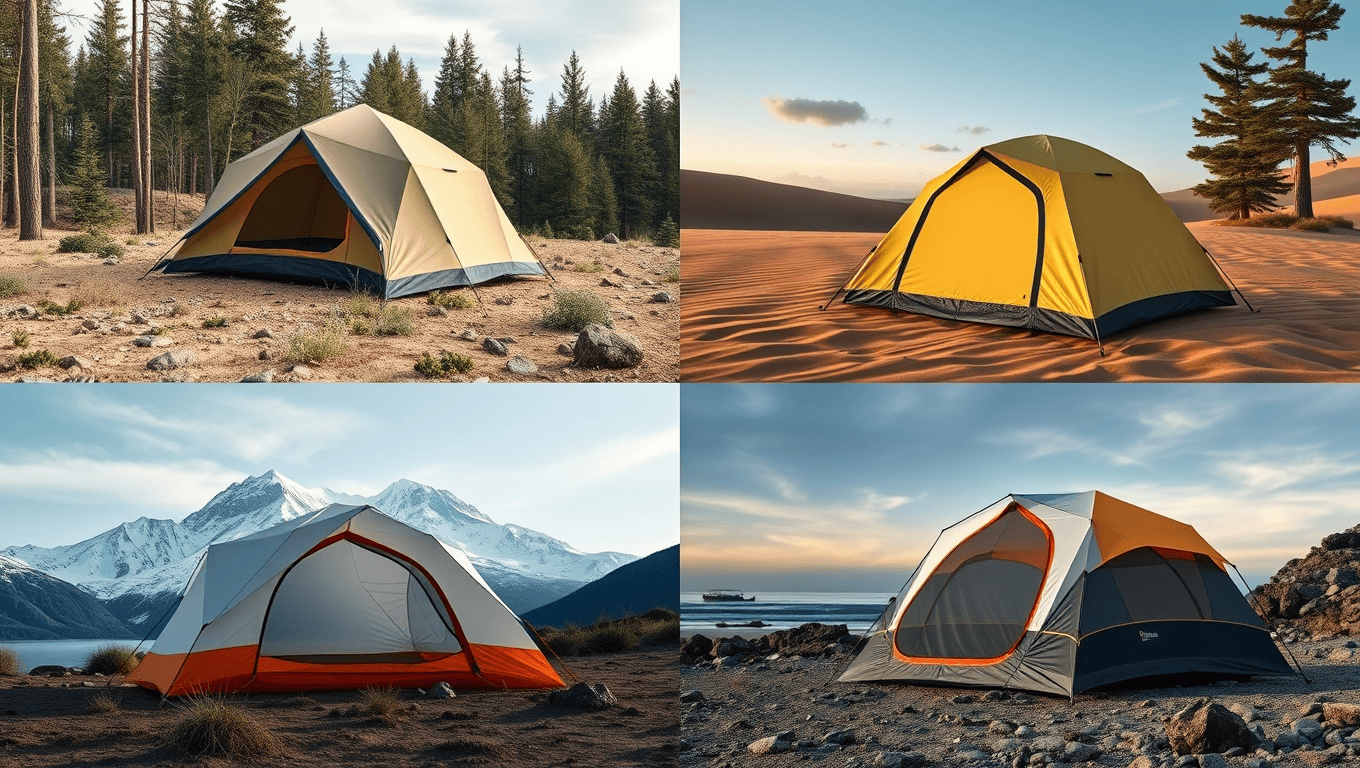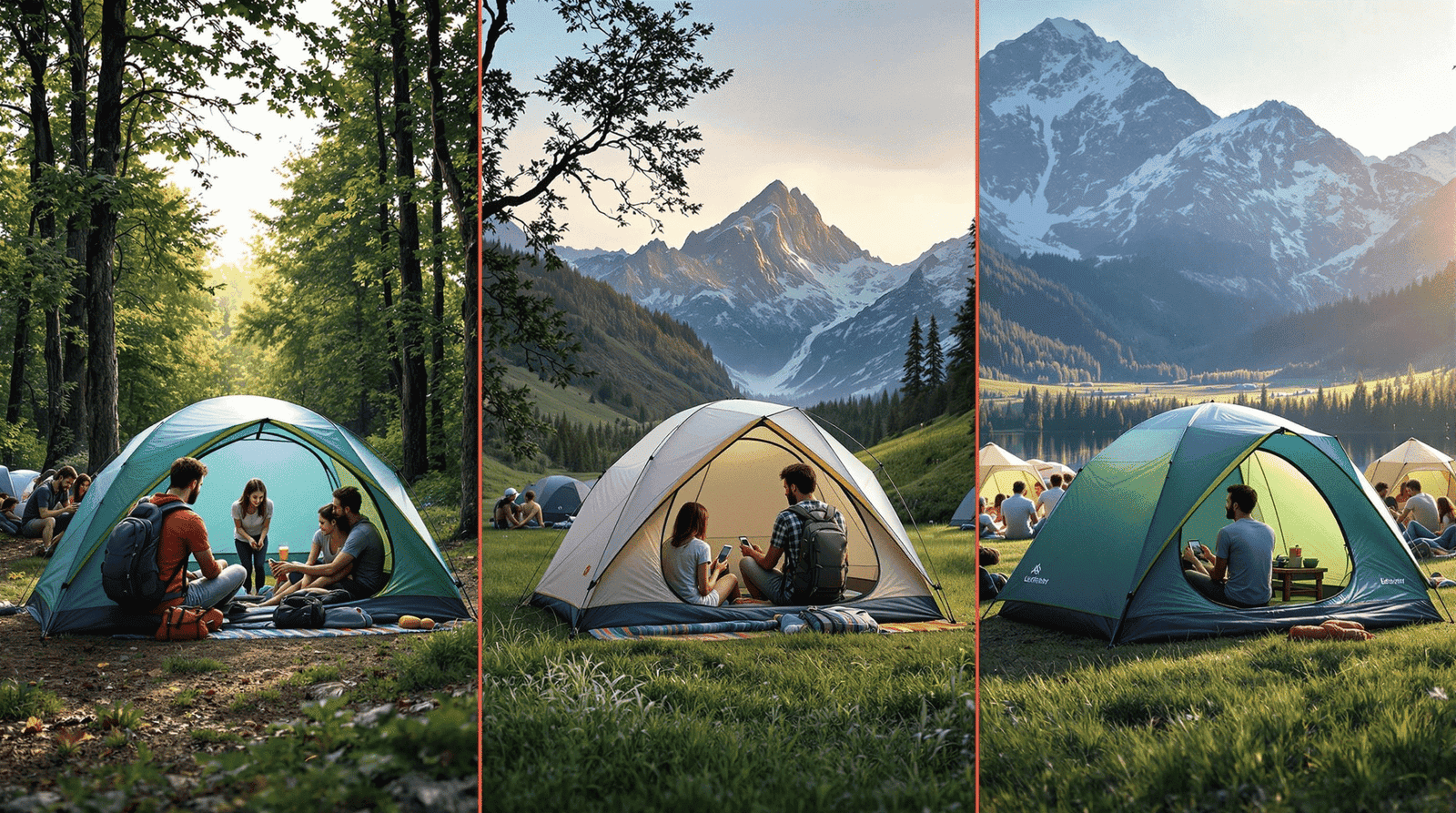Introduction
Rien ne gâche plus vite une sortie en camping que de se réveiller dans une flaque d'eau. En cas de forte pluie, votre tente devient votre abri de survie, mais toutes les déclarations d'étanchéité ne résistent pas à la pression. Qu'il s'agisse de randonneurs bravant les tempêtes en montagne ou de familles ayant besoin d'un espace sec pour leurs enfants, le choix de la bonne tente fait toute la différence entre la misère et les souvenirs.
Chez Kelyland Outdoors, nous avons testé des centaines de tentes sous de véritables averses dans les climats les plus difficiles d'Asie du Sud-Est. Les meilleures tentes imperméables combinent une résistance à la pression hydrostatique de plus de 1 500 mm, des coutures entièrement étanches et une ventilation intelligente, autant de caractéristiques qui distinguent le battage publicitaire d'une véritable protection contre les intempéries. Ci-dessous, nous vous présentons les 10 modèles les plus performants qui permettent aux campeurs de rester au sec lorsque le ciel s'ouvre.
Pourquoi les tentes imperméables sont-elles indispensables en cas de conditions météorologiques difficiles ?
“ Une tente imperméable n'est pas seulement un luxe, c'est votre première ligne de défense contre les conditions météorologiques imprévisibles, qui protège à la fois votre confort et votre équipement lors de vos aventures en plein air. ”
Lorsque vous êtes en pleine nature, la dernière chose que vous souhaitez, c'est vous réveiller dans une flaque d'eau. C'est là qu'une tente imperméable devient votre meilleure alliée. Que vous soyez confronté à des averses soudaines ou à une forte rosée, ces tentes sont conçues pour vous garder au sec. Mais qu'est-ce qui les rend si efficaces ? Voyons cela de plus près.
La science derrière les indices d'étanchéité
Les tentes imperméables sont évaluées en fonction de leur indice de résistance hydrostatique, un terme sophistiqué qui désigne la pression d'eau que le tissu peut supporter avant de fuir. Par exemple, un indice de 2000 mm (comme la technologie exclusive de Kelyland) signifie que le tissu peut supporter une colonne d'eau de 2000 mm sans être trempé. La plupart des tentes pour pluie forte ont une cote minimale de 1 500 mm, mais pour les moussons ou les tempêtes prolongées, une cote plus élevée est indispensable.
Conséquences concrètes de l'absence d'étanchéité
Imaginez que vous montiez votre camp avec une tente non étanche et qu'une tempête s'abatte sur vous. Non seulement votre sac de couchage vous serez trempé, mais vos appareils électroniques et vos provisions risquent d'être endommagés. Lors des essais sur le terrain réalisés par Kelyland pendant la mousson en Asie du Sud-Est, les tentes standard ont cédé en quelques heures, tandis que le matériel de camping tout temps doté d'une étanchéité adéquate a résisté pendant plusieurs jours. La différence ? Des coutures de qualité, des fermetures éclair renforcées et des tissus résistants.
Comment l'imperméabilisation prolonge la durée de vie des tentes
En plus de vous garder au sec, l'imperméabilisation prévient la moisissure et la dégradation du tissu. Une tente traitée avec des revêtements en polyuréthane ou en silicone résiste aux rayons UV et à l'abrasion, ce qui signifie moins de remplacements au fil du temps. Pour les familles ou les festivaliers, cela se traduit par des économies et une fiabilité à long terme.
Étude de cas : Les tests de mousson de Kelyland
En 2024, Kelyland a soumis ses prototypes de tentes étanches à 72 heures de simulation de mousson. Les résultats ? Aucune fuite, un rangement intact du matériel et des structures de piquets stables - la preuve qu'une conception intelligente (comme des coutures effilées et des rainflies ventilées) compte autant que les matériaux.
Adaptation aux besoins des utilisateurs
Les randonneurs privilégient les tentes imperméables légères et compactes, tandis que les familles ont besoin de tentes spacieuses et durables pour les enfants. Les festivaliers ? Une installation rapide et des couleurs vives. Reconnaître ces nuances permet à des marques comme Kelyland de personnaliser des solutions pour divers aventuriers.
Comparaison des performances des tentes imperméables
| Fonctionnalité | Tente de base (sans revêtement) | Milieu de gamme (1500mm) | Premium (2000mm+) | Kelyland OEM Standard |
|---|---|---|---|---|
| Hauteur hydrostatique | 0mm | 1500mm | 2000mm | 2000mm (personnalisable) |
| Résistance aux fuites (tempête de 1 heure) | Échecs | Léger suintement | Secs | Sec (coutures renforcées) |
| Longévité du tissu | 6-12 mois | 2-3 ans | 4-5 ans | 5+ ans (traité aux UV) |
| Pénalité de poids | Le plus léger | +10% | +15% | +12% (conception optimisée) |
| Meilleur pour | Camping dans le désert | Douches d'été | Tempêtes toutes saisons | Expéditions dans des conditions météorologiques extrêmes |
Pour les entreprises qui achètent des tentes, ces informations montrent pourquoi l'imperméabilité doit être une priorité absolue. Les services OEM de Kelyland garantissent que même les petites marques peuvent accéder à des modèles prêts pour les tempêtes sans faire de compromis sur le coût ou la qualité.

Les 10 meilleures tentes imperméables pour les conditions extrêmes
“ De la randonnée ultralégère au camping en famille, ces tentes imperméables allient durabilité et conception intelligente pour relever les défis les plus difficiles de la nature. ”
Le choix des randonneurs : tentes ultralégères de moins de 5 livres
-
Kelyland Summit Lite (1,7 kg, indice 2000 mm) – Parfaite pour les randonneurs qui ont besoin d'une tente imperméable fiable sans pénalité de poids. Elle est dotée de coutures étanches et de deux vestibules.
-
Featherlight Pro (4,2 lb, 1800 mm) – Conception à montage rapide avec double toit enduit de silicone. Idéal pour une utilisation optimale. tente légère et imperméable pour les randonnées besoins.
-
Alpine Nano (4,9 lb, 2500 mm) – Indice d'imperméabilité le plus élevé de sa catégorie, testé sous les pluies de l'Himalaya.
Camping en famille : Tentes spacieuses avec baignoire au sol
-
Dôme familial Kelyland (14 lb, 3000 mm) – Capacité de 8 personnes avec coutures soudées au sol. Notre meilleur modèle imperméable. tentes de camping choix pour les groupes.
-
Rainfort XL (12 lb, 2800 mm) – Les parois verticales optimisent l'espace, comprend un filet de rangement.
-
Stormhaven Cabin (16 lb, 3500 mm) – Double toit intégral avec aérations réglables.
Prêt pour le festival : Tentes étanches à montage rapide
-
PopShield Instant (7 lb, 1500 mm) – Se monte en 30 secondes, comprend des cordes d'ancrage éclairées par LED.
-
Kelyland Festi-Dry (6,5 lb, 2000 mm) – Personnalisation disponible pour les vendeurs, avec vestibule anti-boue.
Tentes d'alpinisme quatre saisons
-
Expedition Fortress (9 lb, 5000 mm) – Les piquets en aluminium résistent à des vents de 60 mph.
-
Kelyland Alpine Pro (3,6 kg, 4500 mm) – Option OEM pour les marques qui ont besoin de tentes imperméables adaptées aux expéditions.
Tableau comparatif : Poids par rapport à l'étanchéité par rapport au prix
Modèle Poids Indice d'imperméabilité Prix Meilleure utilisation Lite du sommet 3.8lbs 2000mm $299 Sac à dos Dôme familial 14lbs 3000mm $499 Camping en groupe Festi-Dry 6.5lbs 2000mm $349 Festivals Alpine Pro 8lbs 4500mm $899 Alpinisme Pour les acheteurs B2B, Kelyland propose tous ces modèles avec un marquage et des matériaux personnalisables, et des quantités minimales de 300 unités. Nos solutions de tentes imperméables OEM aident les marques à se démarquer tout en maintenant des performances adaptées aux tempêtes.

Principales caractéristiques d'une tente vraiment étanche
“ Comprendre la conception des tentes imperméables aide les acheteurs à faire des choix éclairés et les entreprises à s'approvisionner en produits de qualité qui résistent aux conditions réelles. ”
Répartition des matériaux : Technologie des tissus
Le nylon ripstop (30D-70D) avec revêtement PU offre le meilleur compromis entre poids et imperméabilité pour les tentes imperméables. Les mélanges de polyester 2000 mm de Kelyland ajoutent une résistance à la déchirure tout en conservant la respirabilité, ce qui est essentiel pour les tentes imperméables familiales qui doivent être durables.
Étanchéité des joints : Usine ou bricolage
Les coutures collées en usine (comme le soudage par ultrasons de Kelyland) empêchent les fuites au niveau des trous d'aiguille, surpassant ainsi les produits d'étanchéité disponibles sur le marché. Notre contrôle qualité comprend des tests d'immersion dans l'eau pendant 24 heures sur des échantillons aléatoires prélevés dans chaque lot de production.
Comparaison de la couverture du Rainfly
Les arceaux de pluie à couverture totale (s'étendant jusqu'au sol) protègent contre la pluie poussée par le vent, tandis que les conceptions partielles permettent d'économiser du poids. Pour qu'une tente soit imperméable, il faut qu'elle ait une couverture >75% et que les aérations soient placées de manière stratégique.
Systèmes de ventilation intelligents
Les panneaux de toit en maille avec aérations réglables empêchent l'accumulation de condensation, une cause cachée d'humidité à l'intérieur des tentes résistantes à l'eau. Les conceptions testées sous la mousson de Kelyland utilisent les principes de circulation d'air transversale.
Ingénierie du sol de la baignoire
Les sols avec des parois verticales de 6-8" (soudées et non cousues) créent un véritable effet "baignoire". Nos clients OEM peuvent choisir entre trois épaisseurs (150D-300D) en fonction du terrain prévu.
Normes de construction des tentes imperméables
Composant Norme minimale Premium Standard Kelyland QC Test Cote du tissu 1500mm 3 000 mm et plus 2000mm ligne de base Scellement des joints Ruban de silicone Soudure par ultrasons Inspection de la pénétration des colorants Conception des sols Polyester 150D Baignoire 300D Analyse de l'eau de la piscine en 24 heures Protection de la fermeture à glissière Rabat standard Double rabat anti-tempête Essai de 1000 cycles Pour les entreprises, Kelyland propose des consultations techniques afin d'adapter les caractéristiques d'imperméabilité aux marchés cibles, qu'il s'agisse de randonneurs ultralégers nécessitant une protection de 3 000 mm ou de vendeurs de festivals privilégiant les tissus à séchage rapide.
Guide d'achat : choisir la bonne tente imperméable
“ Pour choisir la tente imperméable idéale, il faut trouver le bon équilibre entre votre style de camping, votre budget et les conditions météorologiques locales. Nous vous présentons ici les principaux facteurs à prendre en compte. ”
Adapter le type de tente au style de camping
Les randonneurs ont besoin de tentes imperméables ultralégères (moins de 5 kg), tandis que les campeurs en voiture peuvent privilégier les meilleures tentes de camping imperméables spacieuses avec espace pour se tenir debout. Les tentes étanches abordables pour le camping familial sont dotées de rideaux de séparation et de planchers durables.
Compromis entre prix et performances
Les tentes $100-200 offrent généralement une imperméabilité de 1 500 mm (suffisante pour une pluie légère), tandis que les modèles $300+, comme les solutions OEM de Kelyland, offrent une protection de plus de 3 000 mm pour les moussons.
Interprétation des indices d'étanchéité
Adaptez les caractéristiques à votre climat : 1500 mm pour les averses occasionnelles, 2000 mm et plus pour les besoins de la tente en cas de fortes pluies. Kelyland teste tous les tissus sous des averses simulées pendant 72 heures.
Évaluer la fiabilité de la marque
Les fabricants établis investissent dans le scellement des coutures et le contrôle de la qualité. En tant que partenaire OEM, Kelyland fournit aux détaillants des rapports d'audit d'usine et des échantillons de données de test.
Repérer les signaux d'alerte en matière de révision
Soyez attentif aux plaintes récurrentes concernant les fuites au niveau des coutures ou la condensation, qui sont souvent le signe d'une production précipitée. Nos clients reçoivent des vidéos d'inspection avant expédition montrant les tests d'étanchéité.
Matrice de sélection des tentes imperméables
| Type d'utilisateur | Besoins essentiels | Classement idéal | Fourchette de prix |
|---|---|---|---|
| Sac à dos | Poids, taille de l'emballage | 2000mm | $200-$400 |
| Famille | Espace, durabilité | 3000mm | $300-$600 |
| Festival | Configuration rapide | 1500mm | $150-$300 |
Pour les détaillants, Kelyland propose des solutions de tentes personnalisables avec des quantités minimales de 50 unités, ce qui permet aux marques de se différencier tout en maintenant l'intégrité de l'étanchéité.

Maintenance et entretien pour une imperméabilisation durable
“ Un entretien adéquat peut prolonger de plusieurs années la durée de vie de votre tente imperméable, en préservant ses qualités protectrices tout au long de vos innombrables aventures. ”
Techniques de nettoyage en douceur
Utilisez de l'eau tiède et un savon doux (jamais de détergent) pour nettoyer votre tente imperméable. Les kits d'entretien Kelyland comprennent des brosses spécialisées qui éliminent la saleté sans endommager les revêtements.
Traitement DWR Refresh
Renouvelez l'application du déperlant durable (DWR) toutes les 20 à 30 utilisations. Pour le matériel de camping tout temps, les sprays activés par la chaleur sont plus efficaces lorsqu'ils sont appliqués sur un tissu humide.
Entretien des joints d'étanchéité
Inspectez les joints chaque année. Nos partenaires B2B proposent des services de rescellement utilisant des produits d'étanchéité de qualité industrielle qui correspondent aux spécifications d'origine.
Pratiques de stockage appropriées
Rangez les tentes dans un endroit frais et sec, sans les compresser. Ne compressez jamais une tente humide, car cela accélère la détérioration du revêtement des tentes imperméables.
Dépannage des problèmes courants
Pour entretenir l'imperméabilité de la tente, il faut traiter les revêtements qui s'écaillent avec un nouveau traitement partiel et réparer les petites fuites avec des rustines avant qu'elles ne s'étendent.
Calendrier d'entretien de l'étanchéité
| Tâche de maintenance | Fréquence | Produits nécessaires | Option de service Kelyland |
|---|---|---|---|
| Nettoyage de base | Après chaque voyage | Savon doux, brosse douce | Kit d'entretien inclus avec les commandes OEM |
| Nouvelle demande de DWR | Toutes les 20 utilisations | Spray activé par la chaleur | Traitement en vrac pour les détaillants |
| Inspection des joints | Annuellement | Prise en charge des coutures | Service professionnel de rescellement |
Les détaillants peuvent présenter les kits d'entretien Kelyland comme des produits à valeur ajoutée, générant ainsi des revenus récurrents tout en aidant les clients à protéger leurs investissements.
Conclusion
Après avoir testé des tentes sous la mousson et dans des tempêtes en montagne, j'ai appris une chose : votre abri ne doit pas être laissé au hasard des conditions météorologiques. Une tente imperméable adaptée n'est pas seulement un équipement, c'est aussi une tranquillité d'esprit lorsque le ciel se gâte. Que vous soyez un randonneur qui compte chaque gramme ou une famille qui a besoin d'un espace à l'abri des intempéries, privilégier les indices d'imperméabilité et les coutures étanches fait toute la différence entre un désastre détrempé et un voyage sec et mémorable.
Chez Kelyland, nous avons constaté à quel point une bonne imperméabilité peut transformer l'expérience du camping : nos prototypes classés 2000 mm ont résisté à 72 heures de pluie torrentielle et ont permis à des familles de rester au sec lors d'orages imprévus. La technologie existe pour vous protéger, il suffit de faire le bon choix.
Alors, la prochaine fois que vous achèterez une tente, souvenez-vous : c'est quand la pluie tombe à l'horizontale que vous saurez si votre abri a changé la donne ou s'il s'agit simplement d'un autre équipement qui prend l'eau.
FAQ
-
Q1 : Quelles sont les meilleures tentes imperméables pour les fortes pluies ?
A1 : Les meilleures tentes imperméables pour les fortes pluies comprennent des modèles comme la North Face Wawona 6, la REI Co-op Base Camp 6 ou la Mountain Hardwear Trango 4, conçues pour résister à des conditions météorologiques difficiles.
-
Q2 : Comment savoir si une tente est vraiment étanche ?
A2 : Vous pouvez déterminer la capacité d'étanchéité d'une tente en vérifiant son indice d'étanchéité, appelé colonne d'eau (HH), qui indique la pression d'eau qu'elle peut supporter avant de fuir.
-
Q3 : Quelles caractéristiques dois-je rechercher dans une tente imperméable ?
A3 : Recherchez des caractéristiques telles qu'une construction robuste, des indices HH élevés, des matériaux imperméables, des coutures étanches et un fond de baignoire conçu pour éviter les accumulations d'eau.
-
Q4 : Puis-je imperméabiliser moi-même une tente ?
A4 : Oui, les tentes peuvent être imperméabilisées en appliquant un spray imperméabilisant, en scellant les coutures et en s'assurant que les fermetures éclair sont résistantes à l'eau, bien que les tentes de haute qualité n'aient pas besoin d'être imperméabilisées souvent.
-
Q5 : Certaines tentes sont-elles plus résistantes que d'autres en cas d'humidité ?
A5 : Les tentes fabriquées à partir de matériaux tels que le nylon ou le polyester ripstop sont généralement plus durables et résistent mieux à l'humidité que les tissus moins chers.
-
Q6 : Comment dois-je entretenir ma tente imperméable ?
A6 : L'entretien régulier comprend le nettoyage, le stockage adéquat, la vérification et le colmatage des fuites, et l'utilisation occasionnelle de sprays imperméabilisants pour la tente afin de restaurer sa couche protectrice.
-
Q7 : Quelle est la différence entre une tente imperméable et une tente résistante à l'eau ?
A7 : Les tentes imperméables sont conçues pour être totalement étanches à la pluie, tandis que les tentes résistantes à l'eau peuvent supporter une légère humidité mais risquent de fuir en cas de forte pluie.
-
Q8 : Quelle est la fourchette de prix des bonnes tentes imperméables ?
A8 : Le prix d'une bonne tente imperméable peut varier de $250 à plus de $1200, les caractéristiques, les dimensions et la qualité des matériaux ayant une incidence sur le prix.
Liens externes
- Les meilleures tentes imperméables pour camper sous une pluie battante
- Comment choisir une tente imperméable
- Conseils d'experts sur l'imperméabilisation des tentes
- Les meilleures tentes imperméables pour le camping par tous les temps
- Les meilleures tentes imperméables d'Amazon
- Les 7 meilleures tentes imperméables que vous aimeriez avoir
- Imperméabiliser votre tente : Un guide étape par étape
- Meilleures tentes pour les fortes pluies et le vent
